I Hear America Singing英文诗歌鉴赏
- 格式:ppt
- 大小:844.50 KB
- 文档页数:12
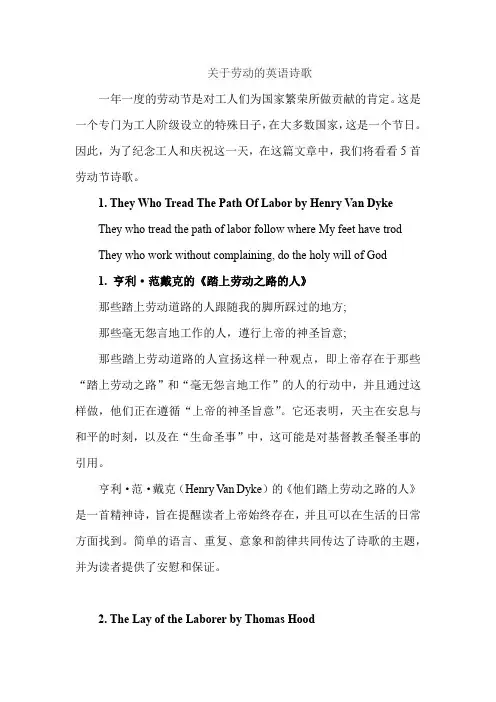
关于劳动的英语诗歌一年一度的劳动节是对工人们为国家繁荣所做贡献的肯定。
这是一个专门为工人阶级设立的特殊日子,在大多数国家,这是一个节日。
因此,为了纪念工人和庆祝这一天,在这篇文章中,我们将看看5首劳动节诗歌。
1. They Who Tread The Path Of Labor by Henry Van DykeThey who tread the path of labor follow where My feet have trodThey who work without complaining, do the holy will of God1. 亨利·范戴克的《踏上劳动之路的人》那些踏上劳动道路的人跟随我的脚所踩过的地方;那些毫无怨言地工作的人,遵行上帝的神圣旨意;那些踏上劳动道路的人宣扬这样一种观点,即上帝存在于那些“踏上劳动之路”和“毫无怨言地工作”的人的行动中,并且通过这样做,他们正在遵循“上帝的神圣旨意”。
它还表明,天主在安息与和平的时刻,以及在“生命圣事”中,这可能是对基督教圣餐圣事的引用。
亨利·范·戴克(Henry Van Dyke)的《他们踏上劳动之路的人》是一首精神诗,旨在提醒读者上帝始终存在,并且可以在生活的日常方面找到。
简单的语言、重复、意象和韵律共同传达了诗歌的主题,并为读者提供了安慰和保证。
2. The Lay of the Laborer by Thomas HoodAs health and morals failShall visit me in the new BastilleThe Spital, or the Gaol2. 托马斯胡德的劳动者之路当健康和道德不行时,将在新的巴士底狱,斯皮塔尔或监狱拜访我!《劳动者之行》开篇,劳动者列举了他手艺的工具,“一把铁锹!耙子!一把锄头!一把镐,或者一张钞票!“,并强调他愿意工作,”这是一只现成的手/去使用所需的工具。

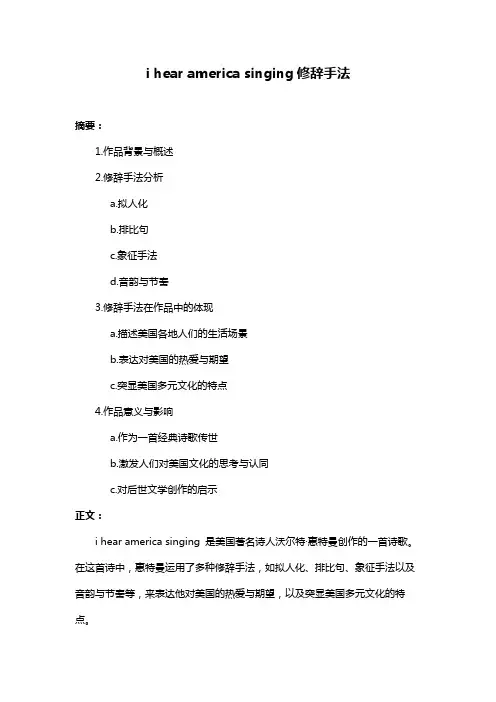
i hear america singing修辞手法摘要:1.作品背景与概述2.修辞手法分析a.拟人化b.排比句c.象征手法d.音韵与节奏3.修辞手法在作品中的体现a.描述美国各地人们的生活场景b.表达对美国的热爱与期望c.突显美国多元文化的特点4.作品意义与影响a.作为一首经典诗歌传世b.激发人们对美国文化的思考与认同c.对后世文学创作的启示正文:i hear america singing 是美国著名诗人沃尔特·惠特曼创作的一首诗歌。
在这首诗中,惠特曼运用了多种修辞手法,如拟人化、排比句、象征手法以及音韵与节奏等,来表达他对美国的热爱与期望,以及突显美国多元文化的特点。
首先,惠特曼在诗中使用了拟人化的修辞手法,将美国各地的人们赋予了歌唱的能力。
通过这种手法,诗人让读者能够更加直观地感受到美国各地人们生活的场景,以及他们为生活奋斗的热情。
其次,惠特曼在诗中运用了排比句,如“the carpenter singing his song, the mason singing his”, 这种手法使得诗歌的节奏感更加鲜明,同时也强调了诗人要表达的主题,即美国各地人们都在用自己的方式歌唱。
此外,诗人还运用了象征手法。
例如,他将美国的国歌《星条旗》与美国的多元文化相联系,通过“t he tuneful chorus”来象征美国各地人们不同的歌声,体现了美国多元文化的特点。
在音韵与节奏方面,惠特曼采用了轻快的节奏和韵律,使得整首诗歌读起来富有生机和活力,与诗中描述的美国各地人们的生活场景相呼应。
总的来说,通过运用这些修辞手法,惠特曼成功地表达了他对美国的热爱与期望,以及对美国多元文化的赞美。
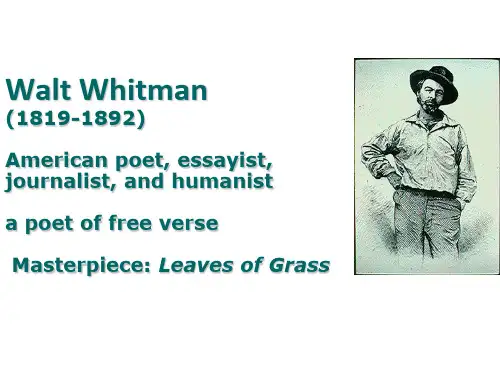
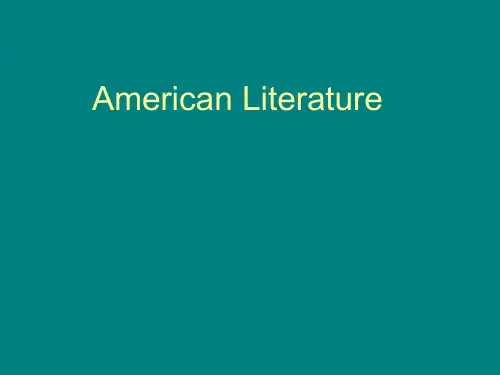

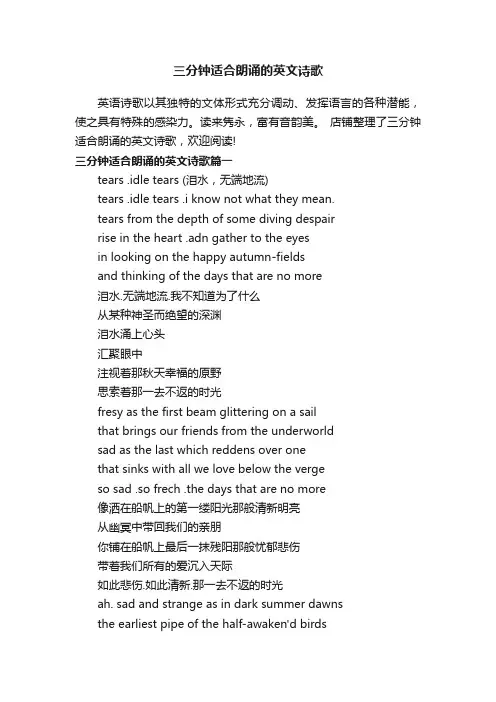
三分钟适合朗诵的英文诗歌英语诗歌以其独特的文体形式充分调动、发挥语言的各种潜能,使之具有特殊的感染力。
读来隽永,富有音韵美。
店铺整理了三分钟适合朗诵的英文诗歌,欢迎阅读!三分钟适合朗诵的英文诗歌篇一tears .idle tears (泪水,无端地流)tears .idle tears .i know not what they mean.tears from the depth of some diving despairrise in the heart .adn gather to the eyesin looking on the happy autumn-fieldsand thinking of the days that are no more泪水.无端地流.我不知道为了什么从某种神圣而绝望的深渊泪水涌上心头汇聚眼中注视着那秋天幸福的原野思索着那一去不返的时光fresy as the first beam glittering on a sailthat brings our friends from the underworldsad as the last which reddens over onethat sinks with all we love below the vergeso sad .so frech .the days that are no more像洒在船帆上的第一缕阳光那般清新明亮从幽冥中带回我们的亲朋你铺在船帆上最后一抹残阳那般忧郁悲伤带着我们所有的爱沉入天际如此悲伤.如此清新.那一去不返的时光ah. sad and strange as in dark summer dawnsthe earliest pipe of the half-awaken'd birdsto dying ears .when unto dying eyesthe casement slowly grows a glimmering aquare so sad ,so strange .the days that are no more啊..夏日里幽暗的黎明.那么哀伤.那么陌生睡眼朦胧的鸟儿,将最早的歌声送入垂死的耳畔将光芒送入垂死的眼睛那么哀伤.那么陌生. 那一去不返的时光dear as remember'd kisses after deathand sweet as those by hopeless fancy feign'don lips that are for others .deep as lovedeep as first love ,and wild with all regreto death in life the days that are no more像死后记忆中的亲吻那般亲切像别人唇上的无望的幻想那般甜蜜像爱一般深沉像初恋一般深沉.悔恨而癫狂我生命中的死亡啊.那一去不返的时光三分钟适合朗诵的英文诗歌篇二to helen 致海伦|海伦之歌by edgar allan poe 爱伦坡王道余译helen,thy beauty is to melike those nicèan barks of yorethat gently, o'er a perfumed sea,the weary way-worn wanderer boreto his own native shore.海伦哦,我眼里你的美丽就像昔日尼西亚的小船,轻柔地在飘香的海面,将那旅途劳顿的游子带回他故乡的海岸。
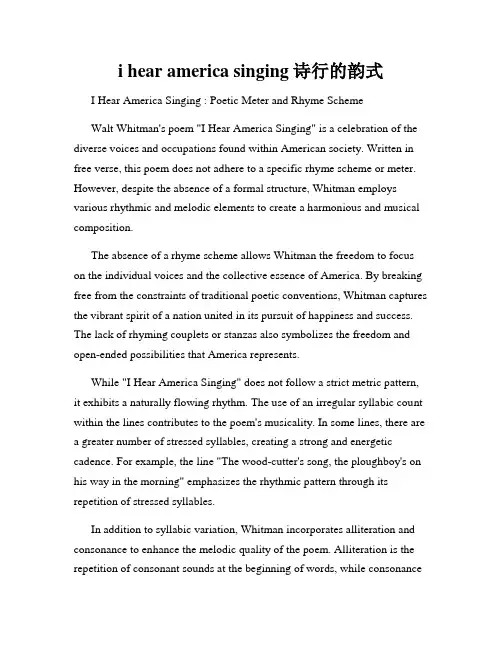
i hear america singing诗行的韵式I Hear America Singing : Poetic Meter and Rhyme SchemeWalt Whitman's poem "I Hear America Singing" is a celebration of the diverse voices and occupations found within American society. Written in free verse, this poem does not adhere to a specific rhyme scheme or meter. However, despite the absence of a formal structure, Whitman employs various rhythmic and melodic elements to create a harmonious and musical composition.The absence of a rhyme scheme allows Whitman the freedom to focus on the individual voices and the collective essence of America. By breaking free from the constraints of traditional poetic conventions, Whitman captures the vibrant spirit of a nation united in its pursuit of happiness and success. The lack of rhyming couplets or stanzas also symbolizes the freedom and open-ended possibilities that America represents.While "I Hear America Singing" does not follow a strict metric pattern, it exhibits a naturally flowing rhythm. The use of an irregular syllabic count within the lines contributes to the poem's musicality. In some lines, there are a greater number of stressed syllables, creating a strong and energetic cadence. For example, the line "The wood-cutter's song, the ploughboy's on his way in the morning" emphasizes the rhythmic pattern through its repetition of stressed syllables.In addition to syllabic variation, Whitman incorporates alliteration and consonance to enhance the melodic quality of the poem. Alliteration is the repetition of consonant sounds at the beginning of words, while consonanceinvolves the repetition of consonant sounds within words. By utilizing these sound devices, Whitman infuses the poem with a lively and musical character. For instance, the line "The mason singing his as he makes ready for work" employs both alliteration with the repetition of the "s" sound and consonance with the repetition of the "ng" sound.Although the absence of a fixed rhyme scheme may initially appear chaotic or disorganized, it aligns with Whitman's vision of America as a diverse and harmonious society. Each line represents a separate voice singing its own unique song, contributing to the symphony of the nation. The lack of rhyme allows for individuality and freedom of expression, echoing the spirit of democracy and equality that defines America.In conclusion, Walt Whitman's "I Hear America Singing" defies traditional poetic structures, presenting a harmonious and diverse chorus of voices. Through the absence of a strict rhyme scheme and meter, Whitman captures the essence of American society. The irregular syllabic count, rhythmic variation, and use of sound devices create a musical composition that celebrates the individual and collective voices within America. By embracing freedom and individual expression, Whitman's poem embodies the spirit of inclusivity and unity that defines the nation.。
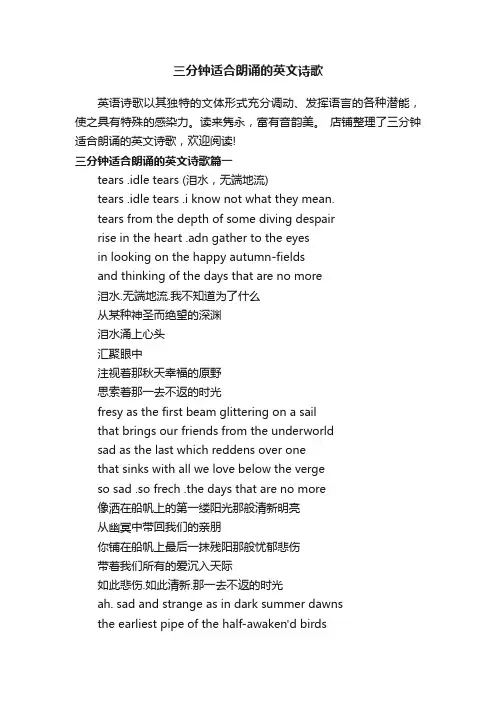
三分钟适合朗诵的英文诗歌英语诗歌以其独特的文体形式充分调动、发挥语言的各种潜能,使之具有特殊的感染力。
读来隽永,富有音韵美。
店铺整理了三分钟适合朗诵的英文诗歌,欢迎阅读!三分钟适合朗诵的英文诗歌篇一tears .idle tears (泪水,无端地流)tears .idle tears .i know not what they mean.tears from the depth of some diving despairrise in the heart .adn gather to the eyesin looking on the happy autumn-fieldsand thinking of the days that are no more泪水.无端地流.我不知道为了什么从某种神圣而绝望的深渊泪水涌上心头汇聚眼中注视着那秋天幸福的原野思索着那一去不返的时光fresy as the first beam glittering on a sailthat brings our friends from the underworldsad as the last which reddens over onethat sinks with all we love below the vergeso sad .so frech .the days that are no more像洒在船帆上的第一缕阳光那般清新明亮从幽冥中带回我们的亲朋你铺在船帆上最后一抹残阳那般忧郁悲伤带着我们所有的爱沉入天际如此悲伤.如此清新.那一去不返的时光ah. sad and strange as in dark summer dawnsthe earliest pipe of the half-awaken'd birdsto dying ears .when unto dying eyesthe casement slowly grows a glimmering aquare so sad ,so strange .the days that are no more啊..夏日里幽暗的黎明.那么哀伤.那么陌生睡眼朦胧的鸟儿,将最早的歌声送入垂死的耳畔将光芒送入垂死的眼睛那么哀伤.那么陌生. 那一去不返的时光dear as remember'd kisses after deathand sweet as those by hopeless fancy feign'don lips that are for others .deep as lovedeep as first love ,and wild with all regreto death in life the days that are no more像死后记忆中的亲吻那般亲切像别人唇上的无望的幻想那般甜蜜像爱一般深沉像初恋一般深沉.悔恨而癫狂我生命中的死亡啊.那一去不返的时光三分钟适合朗诵的英文诗歌篇二to helen 致海伦|海伦之歌by edgar allan poe 爱伦坡王道余译helen,thy beauty is to melike those nicèan barks of yorethat gently, o'er a perfumed sea,the weary way-worn wanderer boreto his own native shore.海伦哦,我眼里你的美丽就像昔日尼西亚的小船,轻柔地在飘香的海面,将那旅途劳顿的游子带回他故乡的海岸。
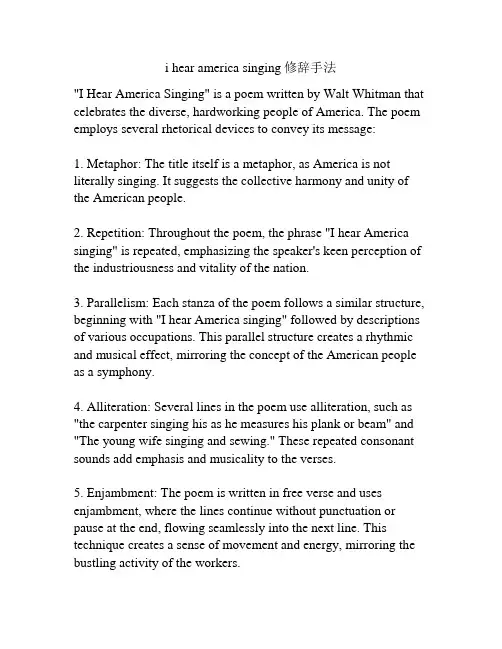
i hear america singing修辞手法"I Hear America Singing" is a poem written by Walt Whitman that celebrates the diverse, hardworking people of America. The poem employs several rhetorical devices to convey its message:1. Metaphor: The title itself is a metaphor, as America is not literally singing. It suggests the collective harmony and unity of the American people.2. Repetition: Throughout the poem, the phrase "I hear America singing" is repeated, emphasizing the speaker's keen perception of the industriousness and vitality of the nation.3. Parallelism: Each stanza of the poem follows a similar structure, beginning with "I hear America singing" followed by descriptions of various occupations. This parallel structure creates a rhythmic and musical effect, mirroring the concept of the American people as a symphony.4. Alliteration: Several lines in the poem use alliteration, such as "the carpenter singing his as he measures his plank or beam" and "The young wife singing and sewing." These repeated consonant sounds add emphasis and musicality to the verses.5. Enjambment: The poem is written in free verse and uses enjambment, where the lines continue without punctuation or pause at the end, flowing seamlessly into the next line. This technique creates a sense of movement and energy, mirroring the bustling activity of the workers.6. Personification: The poem personifies America by suggesting that it sings. This personification represents the collective voice and spirit of the American people.Overall, through these rhetorical devices, "I Hear America Singing" presents a vivid and vibrant image of America's diverse workforce, celebrating the individuals who contribute to the nation's progress and prosperity.。
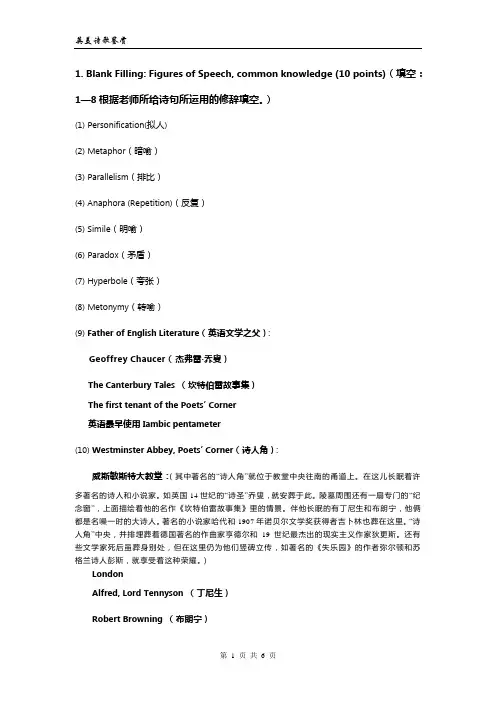
1. Blank Filling: Figures of Speech, common knowledge (10 points)(填空:1—8根据老师所给诗句所运用的修辞填空。
)(1) Personification(拟人)(2) Metaphor(暗喻)(3) Parallelism(排比)(4) Anaphora (Repetition)(反复)(5) Simile(明喻)(6) Paradox(矛盾)(7) Hyperbole(夸张)(8) Metonymy(转喻)(9) Father of English Literature(英语文学之父):Geoffrey Chaucer(杰弗雷·乔叟)The Canterbury Tales (坎特伯雷故事集)The first tenant of the Poets’ Corner英语最早使用Iambic pentameter(10) Westminster Abbey, Poets’ Corner(诗人角):威斯敏斯特大教堂:(其中著名的“诗人角”就位于教堂中央往南的甬道上。
在这儿长眠着许多著名的诗人和小说家。
如英国14世纪的“诗圣”乔叟,就安葬于此。
陵墓周围还有一扇专门的“纪念窗”,上面描绘着他的名作《坎特伯雷故事集》里的情景。
伴他长眠的有丁尼生和布朗宁,他俩都是名噪一时的大诗人。
著名的小说家哈代和1907年诺贝尔文学奖获得者吉卜林也葬在这里。
“诗人角”中央,并排埋葬着德国著名的作曲家亨德尔和19世纪最杰出的现实主义作家狄更斯。
还有些文学家死后虽葬身别处,但在这里仍为他们竖碑立传,如著名的《失乐园》的作者弥尔顿和苏格兰诗人彭斯,就享受着这种荣耀。
)LondonAlfred, Lord Tennyson (丁尼生)Robert Browning (布朗宁)Rudyard Kipling (吉普林)(11)Beowulf(《贝奥武夫》):《贝奥武夫》(Beowulf)一译贝奥武甫。
I Hear America Singing罗显斌(陕西师范大学外国语学院, 陕西西安710062)2002 年11 月陕西师范大学学报(哲学社会科学版) Nov. ,2002 第31 卷专辑Journal of Shaanxi Normal University (Social Science) V o1. 31 Sup.【Abstract】Whitman had a lifelong attachment to the grammatical form of the present participles and the poetic “I”. In this thesis, I proposed that these devices constitute an essential part of his poetics and that they reflect and express some of this poet’s most fundamental ideas and beliefs about life and poetry. Here I used IHEAR AMERICAN SINGING, as illustration, in the hope that some of the conclusions I made here would help us to understand his other poems better.【Key Words】poetic I ; present participles ; parallelism; RomanticismI hear America singing, the varied carols I hear Those of mechanics, each one singing his as it should be blithe and strong The carpenter singing his as he measures his plank or beam The mason singing his as he makes ready for wok , or leaves off work The boatman singing what belongs to him in his boat , the deck hand singing on the steamboat deck The shoemaker singing as he sits on his bench , the hatter singing on his stands The wood cu tter’s song , the plough boy’s song on his way in the morning or at noon intermission or at sundown The delicious singing of the mother , or the young wife at work or the girl sewing or washing Each singing what belongs the day ———at night the party of young fellow , robust , friendly Singing with open mouths , their strong melodious songs.Part one“I’m large , I will contain multitudes” wrote Whitman , expressing his distain for that “foolish consistency” which Emerson declared to be the “bugbear” of smal l mind. In fact Whitman was as many - sided as American life, which he sought to present through the lyric - epic of representative character. However, he was known to few readers in his own life and fiercely attacked by those rare American critics who noticed him at all. Today he has been translated into almost every languages in the world and is universally considered one of the greatest poets He was born on a Long Island farm, the son of a poor Quaker farmer - carpenter. He left school at eleven to work first as an office boy and, later, became a typesetter, schoolmaster, editor, and journalist in succession. Even when he was still a typesetter, he began contributing short stories to his own and other journals. But all these writings were conventional and dull short stories and some very poor sentimental verses. Throughout 1854, he immersed himself in Emerson’s essays. He himself said many years later“, I was simmering, simmering. Emerson brought me to boil” In 1854 - 1855, the thirty - five year old ex - journalist privately printed the first edition of an electrifying book , which many now considered the first volume of truly modern poetry , THE LEA VES OF GRASS. Whitman immediately sent a copy of the book to Emerson, who responded with a dazzling letter of thanks, written on July 11, 1855. I am not blind tothe worth of the wonderful gift of “GRASS”. I find it the most extraordinary piece of wit and wisdom that America has yet contributed ———I give you my joy of your free and brave thought ———I greet you at the beginning of a great career ⋯But Longfellow and all Emerson’s literary friends , excerpt for Thoreau , were so unanimous in their denunciation of the book that Emerson began to doubt his own judgment . The enlarged second edition of LEA VES OF GRASS appeared in 1856 and David McKay brought out the fifth edition, also the so - called deathbed edition in 1892.In 1873, Whitman had a paralytic stroke. He thus spent is last 20 year writing a little, revising and editing a great deal. He died in 1892 in New Jercy; Whitman was a daring experimentalist. His early poems are in the conventional rime and meter, but apparently found necessary to find new poetic techniques befitting to American poems Thus in his first preface to LEA VES OF GRASSS in 1855, Whitman spoke the need of the American nation for a totally new kind of poetry.The poetry of other land lies in the past ———what they have been. The poetry of America lays in the future - what these States and their men and women are certain to be ———the truest and greatest. Poetry can never again in the English language be expressed in arbitrary and rhyming meter, more than the greatest eloquence or truest power and passion.However he never underestimate (in theory at least) the need for poetry to besubtly and necessarily always rhythmic and distinguished easily enough (from) prose. But for the rhyme and the movement of his lines, he went to three different sources.The first was deeply American art of oratory. This was intimately associated with the pulpit oratory of the great puritan speakers in the colonial days as well as with the contemporary political tradition of representative government and free election. One of Whitman’s ambition was to be an orator. He was regular in his attendance at the debating club, which he joint at sixteen. He spent whole days walking along the seacoast practicing speeches to himself or reciting Sh akespeare’s passages to himself. That is why every reader has noticed how often Walt Whitman says “I”. There are few pages of LEA VES OF GRASS without at least some form of the first person pronoun. Yet “I”is not the pronoun that most markedly distinguishes Whitman’s poems. “You” is. Ezra Greanspan called this reader - awareness“vocative technique”. The poems sound like performance with the author addressing “the listener u p there”. The second major source for Whitman’s rhythm was the Italian opera. “But for the opera I could never have written LEA VES OF GRASS. ”Mathiessen comments in the American Renaissance.It is possible also to see likeness to music in the varied repetition of some of his catalogs; or to go 286 farther and note that his method in a poem is to present a main motif, which is repeated, amplified, and recapitulated The third more predictable and more easily identifiable influence was the Atlantic Ocean.He got most of him rhyme from the sound of its surf. He loved the restless Atlantic. The ocean forms the subject as well as the rhythm of his best poems. This can be illustrated in “out of the cradle endlessly rocking”Part twoWhen I began reading this poem, what stroke me most was the consistent recurrence of the present participles and the poetic “I” in this poem. They led me to study his other poems. My conclusion is: Whitman had a lifelong attachment to the grammatical form of the present participles and the poetic “I”.His use of them are not arbitrary and at random. I would like to say that they constitute an essential part of his poetics and that they reflect and express some of this poet’s most fundamental ideas and beliefs about life and poetry. In this thesis, I’d like to make a tentative research on these two devices used in I HEAR AMERICAN SINGING in the hope that some of the conclusions I make here would help us to understand his other poems better.This poem gives me an impression that Whitman sends out his “I” to report on what he sees and hears. ——— mechanics, woodcutters, mother and girls, carpenter and peoples from all levels of life working and enjoying themselves. He rendered these catalogs unified as a formal whole. The primary technique used here to present this picture is the parallelism, which is constructed from regular repetition of the participle phrases. Here we can see these devices serve as unifying or organizing principles.To begin with, I will talk about the participial principle. It is one of the basic building blocks of I HEAR AMERICA SINGING. These present participles stand in relation to each other. The effect of the participial phrases, in a structural arrangement of parallelism, is to carry the potentiality of the persona forward and onward, as it were, without limitation. Here in I HEAR AMERICA SINGING, Whitman imagined the dynamic power of the nation as an activity ———singing. The mechanic the carpenter, the mason, the wood cutter, etc. ———each person separately “singing”his or her individual songs. But where in the “picture” each person performs his or her role separately. It appears in the reader’s mind like a gallery containing a limitless array of randomly selected portraits, through which it takes its reader on poet - guided tour with its potentiality for vitality, breath, fullness and variety. This is the kind of spectacle that both excite Whitman’sensibility and challenge his imagination to construct its fitting verbal representation. He did find it in the parallel participles, which blends the singing individual into a harmonious America song.Present participles also allows him to realize his kinetic vision of life ———a “sprawl”———as a ceaseless motio; of experience as an ongoing process of self - propelled thrust out into the world ;of his time and place as a fluid continuation , transcending beginning and end , as it were , with the potential energy of verbal to convey his sense of the sprawling vitality of modern life to his contemporary audience .In order to do so, in this poem, he employed a highly active vocabulary made up largely of present participles to keep up the basic action, the seeing and recording of the scenes ordinary life, flowing and progressing, the various elements of the scenes moving toward one another . To image this scene without those words would deprive it of its underlying dynamism of American life.As we can see in this poem the location and time of the scenes have been shiftingwith no clearly defined center in the scene. It can be said to be nowhere and everywhere. Since there is no inherent or “authorized” system by which to understand and order his sighting and hearing. Whitman was confronted with the poetic task of contriving a verbal and organizational presentation out of the “disorder”. Whitman found in his poetic “I” an extraordinarily congenial vehicle for his vision of freedom and unrestraint. In this poem, the real weight of the scene is transferred from the objects viewed (the working place) to the subjective viewer “I”. Here Whitm an send out his “I” as a representative American, exploring what he considered representative situations of Americans working and enjoying them. For him, “I”is one of most revealing phenomenon of his poetry, but “who am I?” The answer is “I am Whitman”and “I am not Whitman”,“I am anyone , anywhere and anytime” I am on the building site. I am in the day hearing the mason, the woodcutter singing. I am in the nightclub seeing the young fellow enjoying himself.In short, these two device : the present participle and the poetic “I”allows Whitman to incorporate in his poem the principle of inclusiveness by which life is characterized and to give a free play to an imagination that was remarkably liberalized , for its time , from the constraints of specificity and linearity.They also allow Whitman transform the prosaic facts of life into his energized poetic form by transporting “I” to distant places to see and hear. In short, they serve as a unifying center in the other sprawling poem.Bibliography:1. Carroll C.Calkins, The story of America, New York: The Readers Digest Association, Inc, 19752. Elisabeth B. Booz, A Brief Introduction To Modern American Literature 1919-1980, Shanghai: Shanghai Foreign Language Education Press, 19823. 柯恩, Landmarks of American Literature, 北京: 三联书店, 19884. Wu Dingbo, An outline of American literature, Shanghai: Shanghai Foreign Language Education Press, 19985. Edited by W. P. Trent, J. Erskine & S. P. Sherman, The Cambridge History of English and American Literature, Cambridge, England: University Press, 1997。
SONNET 18 (William Shakespeare)十四行诗Shall I compare thee to a summer's day?Thou art more lovely and more temperate: Rough winds do shake the darling buds of May, And summer's lease hath all too short a date: Sometime too hot the eye of heaven shines,A nd often is his gold complexion dimm’d,And every fair from fair sometime declines,By chance, or nature's changing course untrimm’d: But thy eternal summer shall not fadeNor lose possession of that fair thou ow’st,Nor shall Death brag thou wander’st in his shade, When in eternal lines to time thou grow’st.So long as men can breathe or eyes can see,So long lives this, and this gives life to thee.我怎么能够将你比作夏天?你比夏天更美丽温婉。
狂风将五月的蓓蕾凋残,夏日的勾留何其短暂。
休恋那烈日当空,转眼会云雾迷蒙;休叹那百花凋零,摧折于无常天命;唯有你永恒的夏日长新,你的美貌亦毫发无损。
死神也无缘将你幽禁,你在我永恒的诗中长存。
只要世间尚有人吟诵我的诗篇,这诗就将不朽,永葆你的芳颜。
Structure: Runs in iambic pentameter, rhymed ABAB CDCD EFEF GG.1. What is the theme of this sonnet? Eternality, beauty, immorality2. Why is the speaker’s beloved more lovely than a summer’s day?One thing he is thinking of is how short lived summer is. Another reason he says his love is more beautiful than a summer day is that the summer whether can be harsh, making nature look less beautiful than it does otherwise. 3.There is obviously a shift of tone and subject matter in line 9. Describe such a shift.The author compared the loved one, just in a soft and sentimental tone similar to many love sonnets, to a summer’s day in the first 4 lines, while, in the following 4, developing this concept to the p oor power of people falling to retain the fair against Nature. But in line 9, the author reversed it in a more emotional and definite tone to express the eternal youth of the loved ones.I Hear America Singing (Walt Whitman) 我听见美国在歌唱(沃尔特·惠特曼)I hear America singing, the varied carols I hear.Those of mechanics, each one singing his as it should be blithe and strong,The carpenter singing his as he measures his plank or beam,The mason singing his as he makes ready for work,or leaves off work,The boatman singing what belongs to him in his boat, the deckhand singing on the steamboat deck,The shoemaker singing as he sits on his bench, the hatter singing as he stands,The wood-cutter's song, the ploughboy's on his way in the morning, or at noon intermission or at sundown,The delicious singing of the mother, or of the young wife at work, or of the girl sewing or washing,Each singing what belongs to him or her and to none else,The day what belongs to the day--at night the party of young fellows, robust, friendly,Singing with open mouths their strong melodious songs.我听见美国在歌唱,我听见各种不同的颂歌机器匠在歌唱着,他们每人歌唱着他的愉快而强健的歌,木匠在歌唱着,一边比量着他的木板或梁木,泥瓦匠在歌唱着,当他准备工作或停止工作的时候,船家歌唱着他船里所有的一切,水手在汽艇的甲板上歌唱着,鞋匠坐在他的工作凳上歌唱,帽匠歌唱着,站在那里工作,伐木者、犁田青年们歌唱着,当他们每天早晨走在路上,或者午间歇息,或到了日落的时候,我更听到母亲的美妙的歌,正在操作的年轻的妻子们的或缝衣或洗衣的女孩子们的歌,每人歌唱属于他或她而不是属于任何别人的一切,白昼歌唱白昼所有的,晚间,强壮而友爱的青年们的集会,张嘴唱着他们的强健而和谐的歌。